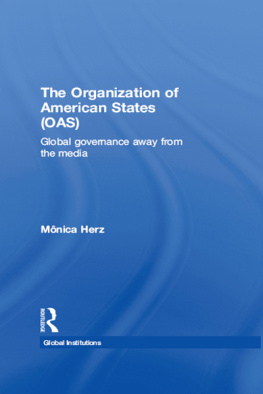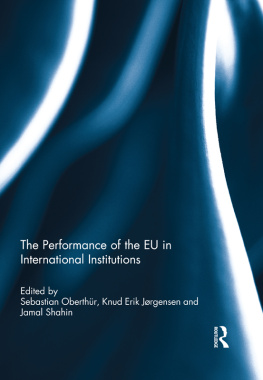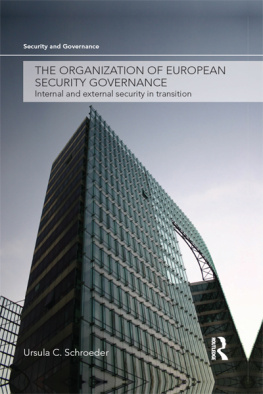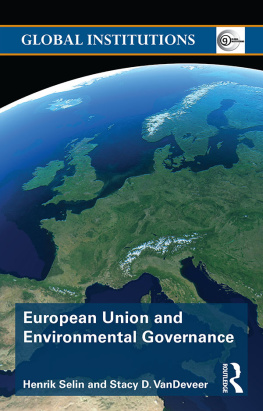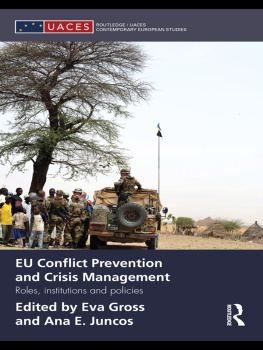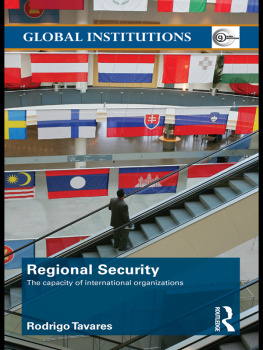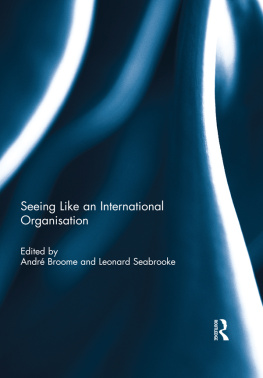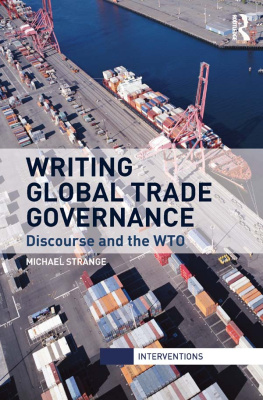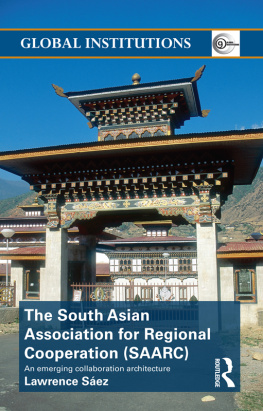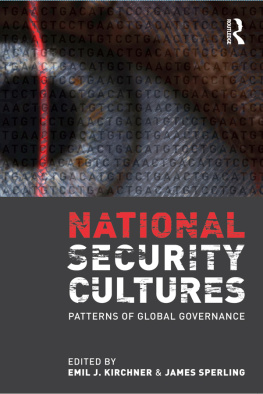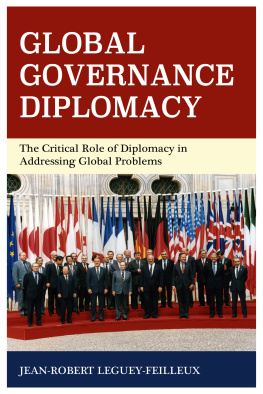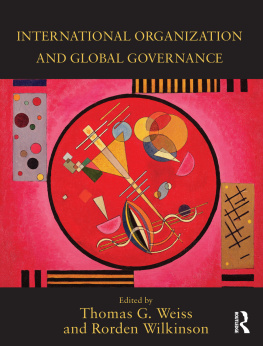The Organization of American
States (OAS)
The Organization of American States (OAS) is the world's oldest regional multifunctional organization. This work provides a clear and comprehensive discussion of this important body, dealing with security, technical cooperation, and the construction of democratic institutions.
Providing an incisive analysis of the history, decision making procedures, relevance, functions, and operations of the OAS, this book also examines the organization in the context of the web of international and regional institutions that deal with global governance and international politics in theWestern Hemisphere. In this accessible and concise text, Mnica Herz seeks to move beyond the well-studied roles of the OAS as a tool of foreign policy and assess the increasing significance of its independent normative and operational activities.
Providing an important resource to those seeking to fully understand the activities and impact of the OAS, this work will be essential reading for all students of Latin American politics, international organization, and global governance.
Mnica Herz is an Associate Professor at the Catholic University of Rio de Janeiro and is the editor of the journal Contexto Internacional. She has written books, chapters, and articles on Latin American security, Brazilian foreign policy, and international organizations.
Routledge Global Institutions
Edited by Thomas G. Weiss
The CUNY Graduate Center, New York, USA
and Rorden Wilkinson
University of Manchester, UK
About the series
The Global Institutions Series is designed to provide readers with comprehensive, accessible, and informative guides to the history, structure, and activities of key international organizations as well as books that deal with topics of key importance in contemporary global governance. Every volume stands on its own as a thorough and insightful treatment of a particular topic, but the series as awhole contributes to a coherent and complementary portrait of the phenomenon of global institutions at the dawn of the millennium.
Books are written by recognized experts, conformto a similar structure, and cover a range of themes and debates common to the series. These areas of shared concern include the general purpose and rationale for organizations, developments over time, membership, structure, decision-making procedures, and key functions. Moreover, current debates are placed in historical perspective alongside informed analysis and critique. Each book also contains an annotated bibliography and guide to electronic information as well as any annexes appropriate to the subject matter at hand.
The volumes currently published are:
50 The Organization of American States (2011)
Global governance away from the media
by Mnica Herz (Institute of International Relations, Catholic University, Rio de Janeiro)
49 Non-Governmental Organizations in World Politics (2011)
The construction of global governance
by Peter Willetts (City University, London)
48 The Forum on China-Africa Cooperation (FOCAC) (2011)
by Ian Taylor (University of St. Andrews)
47 Global Think Tanks (2011)
Policy networks and governance
by James G. McGann with Richard Sabatini (University of Pennsylvania)
46 United Nations Educational, Scientific and Cultural Organization (UNESCO) (2011)
Creating norms in a complex world
by J.P. Singh (Georgetown University)
45 The International Labour Organization (2011)
Coming in from the cold
by Steve Hughes (Newcastle University) and Nigel Haworth (University of Auckland)
44 Global Poverty (2010)
How global governance is failing the poor
by David Hulme (University of Manchester)
43 Global Governance, Poverty, and Inequality (2010)
Edited by Jennifer Clapp (University of Waterloo) and Rorden Wilkinson (University of Manchester)
42 Multilateral Counter-Terrorism (2010)
The global politics of cooperation and contestation
by Peter Romaniuk (John Jay College of Criminal Justice, CUNY)
41 Governing Climate Change (2010)
by Harriet Bulkeley (Durham University) and Peter Newell (University of East Anglia)
40 The UN Secretary-General and Secretariat (2010, 2nd edition)
by Leon Gordenker (Princeton University)
39 Preventive Human Rights Strategies (2010)
by Bertrand G. Ramcharan (Geneva Graduate Institute of International and Development Studies)
38 African Economic Institutions (2010)
by Kwame Akonor (Seton Hall University)
37 Global Institutions and the HIV/AIDS Epidemic (2010)
Responding to an international crisis
by Franklyn Lisk (University of Warwick)
36 Regional Security (2010)
The capacity of international organizations
by Rodrigo Tavares (United Nations University)
35 The Organisation for Economic Co-operation and Development (2009)
by Richard Woodward (University of Hull)
34 Transnational Organized Crime (2009)
by Frank Madsen (University of Cambridge)
33 The United Nations and Human Rights (2009, 2nd edition)
A guide for a new era
by Julie A. Mertus (American University)
32 The International Organization for Standardization (ISO) (2009)
Global governance through voluntary consensus
by Craig N. Murphy (Wellesley College) and JoAnne Yates (Massachusetts Institute of Technology)
31 Shaping the Humanitarian World (2009)
by Peter Walker (Tufts University) and Daniel G. Maxwell (Tufts University)
30 Global Food and Agricultural Institutions (2009)
by John Shaw
29 Institutions of the Global South (2009)
by Jacqueline Anne Braveboy-Wagner (City College of New York, CUNY)
28 International Judicial Institutions (2009)
The architecture of international justice at home and abroad
by Richard J. Goldstone (Retired Justice of the Constitutional Court of South Africa) and Adam M. Smith (Harvard University)
27 The International Olympic Committee and the Olympic System (2009)
The governance of world sport
by Jean-Loup Chappelet (IDHEAP Swiss Graduate School of Public Administration) and Brenda Kbler-Mabbott
26 The World Health Organization (2009)
by Kelley Lee (London School of Hygiene and Tropical Medicine)
25 Internet Governance (2009)
The new frontier of global institutions
by John Mathiason (Syracuse University)
24 Institutions of the Asia-Pacific (2009)
ASEAN, APEC, and beyond
by Mark Beeson (University of Birmingham)
23 UNHCR (2008)
The politics and practice of refugee protection into the twenty-first century
by Gil Loescher (University of Oxford), Alexander Betts (University of Oxford), and James Milner (University of Toronto)
22 Contemporary Human Rights Ideas (2008)
by Bertrand G. Ramcharan (Geneva Graduate Institute of International and Development Studies)
21 The World Bank (2008)
From reconstruction to development to equity
by Katherine Marshall (Georgetown University)
20 The European Union (2008)
by Clive Archer (Manchester Metropolitan University)
19 The African Union (2008)
Challenges of globalization, security, and governance
by Samuel M. Makinda (Murdoch University) and Wafula Okumu (McMaster University)

